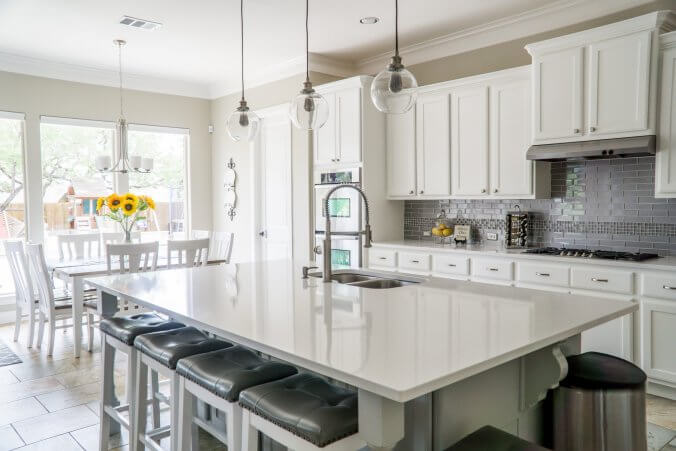Here are five common errors people often make during their Kitchen Renovation. Pay close attention!
1. The Wrong Contractor
If you had high hopes of saving money on your Kitchen Renovation, think again. Asking friends who did similar projects for advice will only lead to disappointment. Unless you know exactly how much experience each contractor has and which trades he/she specializes in, you’ll likely find yourself dealing with an amateur who lacks proper training and tools. This means costly mistakes, wasted time and materials, and even potential injury.
In addition, hiring unlicensed workers puts both you and your wallet at risk. If anything goes wrong, you won’t be able to hold anyone accountable. So do your homework and ask questions about the company’s background, liability insurance coverage and worker’s compensation policy. Get proof of licenses from state trade boards as well as references from previous clients. Finally, look into whether the firm has any past complaints filed against it online.
When interviewing prospective contractors, keep note of key traits such as punctuality, quality assurance standards, communication skills, professionalism, safety practices and willingness to answer your questions clearly and directly. Also, ask to see samples of prior work, including color swatches, floor plans and detailed construction specifications.
2. Unclear Instructions and Poor Communication
While most homeowners want every detail attended to during their kitchen renovation, sometimes this desire gets lost amidst the excitement. When the going gets tough, having clear instructions becomes essential. For example, if you need help installing cabinets or countertops, asking too many questions will cause stress for both parties. Instead, write down specific measurements and sketch a layout plan showing where everything needs to go. Then leave it up to the professionals, whose job it is to ensure accuracy.
During the design phase, also consider involving family members and other interested parties such as interior designers and architects. Their input will add value to the process and make everyone happy once the space comes together. To stay organized, use task lists, meeting minutes and written contracts. Make sure all team members receive copies and read through them carefully before beginning construction.
And remember that communication between you and others involved in your project plays a vital role. Letting others know ahead of time what you expect helps prevent last minute surprises. Plus, communicating effectively saves time, energy and money.
So don’t let poor planning hinder your progress. Use technology wisely to manage tasks efficiently and minimize delays. Document issues quickly to resolve problems faster and better communicate with vendors and subcontracted teams.
3. Improper Measurements & Materials
Many beginners tend to underestimate needed supplies until they’re already halfway through the project. After ordering too many parts, cutting corners and spending extra cash on unnecessary extras, unexpected expenses can skyrocket. Take care to estimate costs accurately based on accurate measurements. Don’t cut corners here, either.
Avoid using inferior products designed specifically for lower prices. They might save today, but they could hurt tomorrow.
Also, make sure you provide correct dimensions for cabinetry, appliances and fixtures. These items shouldn’t come back to haunt you later. Most manufacturers require these specs to produce precision components. And since measuring devices vary from person to person, rely on official scales and measurement tapes instead of estimates. Lastly, request product manuals and installation guides from companies offering professional services. Having thorough information makes future installations easier.
4. Not Using Quality Products & Tools
Quality products are the foundation of a successful project. With limited funds, it’s tempting to skimp on expensive specialty finishes and hardware choices. However, buyers typically regret this decision later, especially when trying to resell their house. While it might seem cheaper to buy inexpensive laminate counters versus granite, chances are that’s not true. Besides being difficult to clean and prone to scratches, cheap surface material tends to chip easily. Also, low cost stainless steel sinks might appear great initially, but wear and tear can damage them fast. Even worse, poorly installed faucets can result in disastrous water leaks.
Don’t choose bargain basement brands without consulting experts.
Ask your architect or designer what types of products would best suit your budget and lifestyle. He or she will recommend reputable options and steer you away from risky decisions. And never skip out on buying top-of-the-line tools. A simple tool kit can include hammers, nails, screwdrivers and drill bits. Investigate local stores’ selection to find a handyman supply store near you.
5. DIY Errors (Like Screwing In a Light Fixture Without a Plumber)
With all due respect to Bob Villa of Bob Vila Television fame, novice homeowners aren’t necessarily equipped to handle major household repairs themselves. First timers often try tackling jobs like hanging light fixtures, painting walls and caulking cracks on their own. Unfortunately, these chores involve specialized knowledge and tools, both of which inexperienced hands lack. Such actions can turn routine maintenance nightmares into life threatening accidents. Consider calling a trusted plumber or electrician for assistance.
Similarly, replacing old switches and outlets requires special expertise. Before attempting to replace breakers or fuse boxes, consult a licensed electrician. Otherwise, you could kill yourself, burn down your house or electrocute neighbors. Also, don’t assume you know how to install ceiling fans or HVAC ductwork. Professional guidance is crucial to avoiding injuries and financial losses.
Final Word
Whether you hire pros or tackle a project yourself, keeping track of receipts, warranties and paperwork is critical. Accurate record-keeping shows managers, sales personnel and accountants alike that you didn’t waste money unnecessarily, and it keeps you safe by preventing fraud.
A typical kitchen renovation can run upwards of $50,000, but the average cost per square foot ranges widely depending upon location, size and scope. Some areas charge more than twice as much as others. Factors affecting price include land value, taxes, utilities, lot shape and condition, number of bedrooms and baths, parking spaces, proximity to public transportation, accessibility to shopping centers and highway traffic, among other factors.
